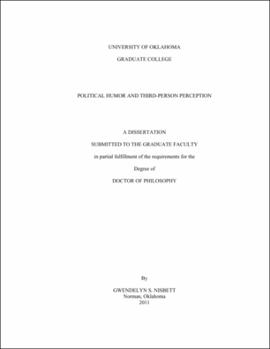| dc.contributor.advisor | Hansen, Glenn J | |
| dc.creator | Nisbett, Gwendelyn | |
| dc.date.accessioned | 2019-05-01T17:22:31Z | |
| dc.date.available | 2019-05-01T17:22:31Z | |
| dc.date.issued | 2011 | |
| dc.identifier | 99103074002042 | |
| dc.identifier.uri | https://hdl.handle.net/11244/319387 | |
| dc.description.abstract | Political humor shows like The Daily Show and the Colbert Report are not only very popular, they are also increasingly becoming a legitimate news source for certain audiences (particularly young people). The purpose of this study was to compare political humor with traditional news. Third-person perception (TPP) was utilized as a theoretical framework. The goal of the project was to examine TPP levels for political humor compared to news to better gauge how audiences interpreted source and message factors. | |
| dc.description.abstract | Results show two major themes to emerge: message evaluation and social identity. In terms of message and source evaluation, there was no significant difference in political humor and news. There were no significant interactions for source credibility, message quality, perceived bias, and perceived negative impact as moderators between condition (political humor or news) and TPP. There was a significant interaction for humorousness of message, but only for the political humor condition. | |
| dc.description.abstract | On the contrary, the second major theme - social identification - resulted in significant differences between political humor and news. Fan of humor, ideology, and social distance were significant moderators of condition on the dependent variable TPP. This suggests that social identification plays a significant part in the processing of political humor content compared to news content. Implications of the results of the study are discussed and further research is suggested. | |
| dc.format.extent | 123 pages | |
| dc.format.medium | application.pdf | |
| dc.language | en_US | |
| dc.relation.requires | Adobe Acrobat Reader | |
| dc.subject | Mass media--Political aspects | |
| dc.subject | Politics and culture | |
| dc.subject | Wit and humor | |
| dc.title | Political Humor and Third-Person Perception | |
| dc.type | text | |
| dc.type | document | |
| dc.thesis.degree | Ph.D. | |
| ou.group | College of Arts and Sciences::Department of Communication | |
